France
Experience The Romance and Allure of France
If there is one country in Europe that you must experience, it is France. It is truly the epitomy of fine culture, historical significance, beautiful architecture, great art, fine food and exquisite artwork. From the picturesque quintessential view of the Eiffel tower along the Seine river, to the magnificence of the Palace at Verssaille and the fabulous art musems and charming sidewalk cafes, you will return with memories to last a lifetime.
Paris: The City of Lights
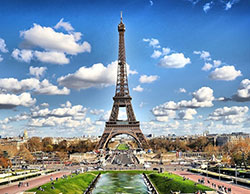
Photo by Thorsten Technoman / Pexels | Pais, the epitome of cultural elegance and romance beguiles the visitor with its ornate architecture along the Seine River and captivating history. A visit to Paris should ideally include a day spent at the Louvre Museum, a treasure trove of artistic masterpieces, and if time permits, the Orsay Museum where you can see Monet's massive water lily paintings created at the end of his life. |
Don't miss the magnificent Palace of Versailles, it can be reached via a 20 minute subway (Métro) ride from Paris and makes a great day trip. Tour the exqusitely appointed rooms and see how King Louis XVI and Marie Antoinette lived and enjoy the beautiful gardens. Consider visiting the great impressionist Monet's house and garden at Giverny, which is about an hour from Paris via subway and see the beautiful gardens he created which inspired his water lily paintings. To avoid the long lines, book your tickets online in advance of your visit.
While in Paris, take a mid-morning break from sightseeing and enjoy a "café au lait" (pronounced "ka-fey oh-lay") with a buttery croissant in a cozy café and later in the day indulge in a delightful array of cheeses, all while sipping regional wines. After your visit to the Louve, take a late afternoon stroll through the lovely Tuileries Gardens and continue along the Champs-Élysées past haute couture shops. Treat yourself to a lite supper an one of the many outdoor cafes. Later, go for an evening walk along the Seine and the beautiful romantic bridges and be dazzled by the city of lights at night. And of course, wear good walking shoes! (And don't use the Eiffel Tower as a landmark to find your way back to your hotel -- its the same on all four sides and you'll get lost!). Keep your hotel address with you so you can hail a cab just in case you do. (Been there, done that!)
Note: The media has reported there is currently a bedbug outbreak in Paris, and while this problem can occur anywhere in the world, you may want to postpone your visit to Paris until they get this problem under control. If you still wish to visit, do take precautions and research how to protect yourself (see Health Precaution Tips below).
|
Provence: A Feast for the Senses

Photo by Hans / Pixabay | Venture into the serene region of Provence, where time seems to slow down, and nature flourishes in vibrant colors. The charming town of Aix-en-Provence welcomes with its elegant boulevards and picturesque squares, and fountains. Visit the beautiful Abbaye de sénanque, a Cistercian abbey nestled in fragrant lavendar fields near the village of Gordes in the Provence-Alpes-Côte d'Azur region. |
| Explore the charming medieval villages of Gordes and Roussillon with their cobblestone streets, pastel-hued facades, and panoramic vistas of rolling vineyards and olive groves. And as the sun sets, indulge in the exquisite flavors of Provençal cuisine, while sipping a glass of locally produced rosé.
|
Normandy: Where History Comes Alive
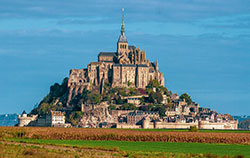
Photo by Son Nguyễn Đình / Pixabay | The region of Normandy offers both scenic beauty and historical significance. The magnificient Mont Saint-Michel, a medieval abbey perched on a rocky island has been a pilgrimage site for centuries and is worth visitng, however it does have many steps to access the abbey. You can also visit Honfleur, a charming town with a picturesque harbor, lined with colorful half-timbered houses along the Seine Estuary. |
| Explore the historic beaches of D-Day, where the echoes of bravery and sacrifice still linger, and honor the heroes who fought for freedom. Explore the medieval streets of Rouen, where the imposing Gothic cathedral stands as a testament to the city's rich heritage. Enjoy the flavors of Normandy and try some creamy camembert cheese, savor delicate apple tarts, and sample the region's renowned apple brandy, Calvados. |
Loire Valley: Land of Châteaus and Vineyards
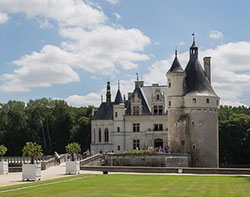
Photo by Gilles Lagnal / Pixabay | Embark on a majestic journey through the Loire Valley, where fairy tales come to life amidst sprawling vineyards and grand châteaux. Lose yourself in the opulence of Château de Chambord, its intricate details and magnificent gardens leaving you in awe. Delve into the romantic history of Château de Chenonceau, gracefully spanning the Cher River and enchanting visitors with its timeless beauty. |
| Cycle along the gentle curves of the Loire River, passing through charming villages and vineyard-dotted landscapes. And, of course, treat your taste buds to the exquisite flavors of Vouvray and Sancerre wines, perfectly paired with delectable regional cuisine.
|
Bordeaux: The Wine Connoisseur's Haven

Photo by Elementus / Pixabay |
The Bordeaux region is renowned for its prestigious vineyards and world-class wines where you can go on a wine-tasting journey through the Médoc. Explore renowned châteaux like Château Margaux and Château Lafite Rothschild. Immerse yourself in the elegance of Bordeaux city, with its magnificent architecture and vibrant squares. Stroll along the Garonne River, taking in the beauty of the Place de la Bourse and its iconic water mirror. |
| Treat yourself and indulge in the art of pairing exquisite wines with gourmet dishes in Michelin-starred restaurants. Bordeaux is a paradise for the senses, where wine, culture, and refined living converge.
|
Dordogne: The Valley of Prehistory

Photo by Slimmars / Pexels | Travel back in time to the enchanting region of Dordogne, where medieval castles, prehistoric caves, and idyllic villages await. Explore the fairytale town of Sarlat-la-Canéda, with its well-preserved medieval architecture and bustling markets. Marvel at the awe-inspiring cliffside village of Rocamadour, a UNESCO World Heritage Site. Discover the prehistoric wonders of Lascaux, with its famous cave paintings. |
| Cruise along the Dordogne River, admiring the stunning landscapes and stopping at charming towns like Beynac-et-Cazenac. Dordogne offers a captivating blend of history, natural beauty, and gastronomic delights.
|
French Riviera: Playground of the Rich and Famous

Photo by ArTo / Adobe Stock | Experience the sun-soaked glamour of the French Riviera, aka/ The Cote Azur. One of the most popular destinations in this area is Nice, renowned for its stunning beaches, vibrant markets, and artistic heritage. Wander through the charming Old Town, with its narrow streets, colorful facades, and delightful cafés. Explore the famous Promenade des Anglais, lined with palm trees and offering breathtaking views of the Mediterranean Sea. Visit the Musée Matisse, dedicated to the works of the renowned artist. |
| Indulge in the local cuisine, from traditional Niçoise dishes to exquisite seafood delicacies. Nice is beautiful destination that embodies the essence of Mediterranean charm and sophistication. |

Photo by Xbrchx / Adobe Stock |
Another beautiful coastal town on the French Riviera near Nice is Villefranche-sur-Mer, which translates to "Free Town on the Sea". The town has a beautiful harbor, a lively old town, and several museums and galleries. There are also plenty of restaurants, cafes, and shops to explore. A few other popular destinations in the French Riviera include glamorous Cannes, a resort city known for its annual film festival, and trendy Saint-Tropez, another resort town known for its exclusive beaches and nightlife.
|
Best Time to Visit:
The ideal time to visit France largely depends on your personal preferences and the experiences you seek. France is a year-round destination, offering diverse attractions in each season. Keep in mind that specific regions of France may have their own microclimates and seasonal variations. Here's a breakdown of the seasons to help you decide:
Spring (April to June): Spring is a lovely time to visit, as the weather is mild, and the landscapes burst with vibrant colors. It's an ideal season for exploring cities, gardens, and outdoor attractions, avoiding the crowds of summer.
Summer (July to August): Summer in France is peak tourist season, with warm weather and long daylight hours. It's an excellent time for outdoor activities, beach vacations, and popular festivals. However, be prepared for larger crowds and higher prices, especially in tourist hotspots.
Autumn (September to November): Autumn brings pleasant weather, fewer crowds, and picturesque fall foliage. It's a great time for wine enthusiasts to visit vineyards and experience the grape harvest. You can also enjoy cultural events and visit museums without the summer rush.
Winter (December to February): Winter in France offers a unique charm, especially during the holiday season. It's a great time to visit Christmas markets, go skiing in the French Alps, or explore cultural sites with fewer tourists. Some regions, like Provence, may have milder weather.
Travel Planning Tips:
Duration of Stay: France has much to offer, so consider the length of your stay carefully. While it's tempting to cover as much ground as possible, it's also important to allow ample time to explore each destination and immerse yourself in the local culture.
Cash and Currency: The official currency in France is the Euro (€). It's advisable to carry a mix of cash and credit/debit cards, as some establishments may not accept cards for small purchases. Inform your bank about your travel plans to avoid any issues with your cards. Be alert when using ATMs outdoors.
Travel Insurance: It is highly recommended to have travel insurance that covers medical emergencies, trip cancellations, and lost or stolen belongings. Ensure your insurance provides adequate coverage for your specific needs.
Local Customs and Etiquette: Familiarize yourself with French customs and etiquette. Greet with a "Bonjour" (hello) or "Bonsoir" (good evening) when entering shops, restaurants, or interacting with locals. Politeness and respect for local customs go a long way.
Cuisine and Dining: France is renowned for its gastronomy. Explore local markets, bakeries, and restaurants to savor the diverse regional cuisine. Don't forget to try iconic dishes like croissants, baguettes, cheese, wine, and traditional French delicacies. Note that butter is usually not served with baguettes, so you will need to request it.
Allow more time when dining: Expect that it will take longer than you are accustomed to, as dining is customariy a more leisurely experience in France. If you can't linger, you'll need to politely get the waiters attention and ask for the check. Here are some ways to do this:
- Make eye contact: Catch the waiter's attention by making brief eye contact and perhaps a small nod or smile.
- Raise your hand slightly: To signal the waiter discreetly, you can raise your hand slightly, palm facing down. This gesture is a non-verbal way of indicating that you need assistance.
- Use "Excusez-moi": Gently say "Excusez-moi" (pronounced "ex-koo-zay mwah"), which means "Excuse me." This polite phrase indicates that you would like to speak with the waiter.
- "L'addition, s'il vous plaît": Once you have the waiter's attention, you can politely ask for the check by saying, "L'addition, s'il vous plaît" (pronounced "lah-dee-see-on, see voo play"), which means "The bill, please."
Travel Documents: Ensure you have a valid passport and ensure you have all the necessary travel documents.
Travel Advisories Stay updated on current events, local regulations, and any travel advisories when traveling abroad. Visit the US Government State Department Travel Advisories web site to check on the status of your destination.
Accommodations:
When choosing your accommodation, consider factors such as location, amenities, proximity to attractions, and your personal preferences. It's advisable to book in advance, especially during peak travel seasons, to secure the best options and rates.
- Hotels: France has a plethora of hotels ranging from luxury five-star establishments to budget-friendly options. You'll find internationally renowned chains, boutique hotels, and family-run accommodations. Hotels often provide amenities such as concierge services, room service, and on-site restaurants.
- Bed and Breakfasts (Chambres d'hôtes): Charming bed and breakfast establishments are prevalent in the French countryside. These cozy accommodations offer comfortable rooms with a personal touch, often including a delicious homemade breakfast. Staying in a bed and breakfast allows you to experience warm hospitality and immerse yourself in the local culture.
- Châteaux and Historic Residences: For a unique and luxurious experience, consider staying in a château or historic residence. Many grand castles and manor houses have been converted into hotels or exclusive accommodations. These enchanting properties offer a glimpse into France's rich history and provide a truly memorable stay.
- Guesthouses (Maisons d'hôtes): Similar to bed and breakfasts, guesthouses provide a more intimate experience. These family-run accommodations are often located in historic buildings or countryside estates, offering comfortable rooms, personalized service, and the opportunity to connect with local hosts.
- Vacation Rentals: Renting a vacation home, apartment, or villa is a popular choice, especially for families or those seeking more space and privacy. Platforms like Airbnb, HomeAway, and VRBO offer a wide selection of rentals across France, from cozy apartments in city centers to luxurious villas in the countryside.
Transportation:
- Domestic Flights: If you're planning to cover long distances within France or visit remote areas, regional flights can be a convenient option. Several airlines operate domestic flights connecting major cities and regional airports. Air France is the national carrier, but there are other low-cost carriers like Ryanair and EasyJet as well. Compare prices and check baggage restrictions before booking.
- Trains: France has an extensive and efficient railway network operated by SNCF (Société Nationale des Chemins de Fer Français). Trains are a popular mode of transportation for long-distance travel between cities and regions. The high-speed TGV trains can reach speeds of up to 320 km/h (200 mph). It's advisable to book train tickets in advance, especially during peak travel seasons, to secure the best fares.
- Métro and Public Transportation:
In cities like Paris, Lyon, Marseille, and Toulouse, you'll find efficient and extensive public transportation systems. Métro (subway) networks are available in many cities, along with trams and buses. Consider purchasing a transportation pass for unlimited travel within a certain period, as it can be cost-effective and convenient.
- Public Transportation Apps: Consider using transportation apps like RATP (for Paris) or Moovit, which provide real-time schedules, maps, and navigation for public transportation options in various cities.
- Buses: Buses are an affordable option for traveling within cities or shorter distances between towns. In France, the major intercity bus operator is Ouibus (now BlaBlaBus), offering connections to various destinations. Local public transportation buses are available in cities and towns, providing an economical way to explore the local areas.
- Rental Cars: Renting a car gives you the flexibility to explore remote areas and smaller villages. Major car rental companies have offices at airports and in city centers. Make sure to have an international driver's license, valid insurance, and familiarize yourself with local traffic laws. Note that parking in city centers can be limited and expensive.
- Tolls: When driving on major highways and autoroutes, you may encounter toll booths. Keep some cash or a credit card handy to pay the toll fees. The amount varies depending on the distance traveled and the type of vehicle.
- Taxis: Taxis are readily available in major cities and airports. Official taxis have meters, and it's advisable to use licensed taxis to ensure safety and avoid scams. Uber operates in some cities in France, offering an alternative to traditional taxis.
- Velib' Bikes: In cities like Paris, you can rent bicycles from the Velib' bike-sharing system. It's a popular and eco-friendly way to explore the city, with numerous docking stations available for pickup and drop-off.
- Walking: Many cities and towns in France are pedestrian-friendly, with well-preserved historic centers and charming neighborhoods. Walking is a delightful way to discover local shops, cafés, and hidden gems.
Health Precautions:
- Bedbug Warning:
There is currently a bedbug outbreak in Paris, France. Bedbugs can be a nuisance and can cause itchy bites, and they could travel home with you in your luggage and are difficult to eradicate. To help protect yourself, consider using bedbug luggage liners. Don't put your luggage on the bed, use a luggage rack to keep your luggage off the floor in your hotel room and/or put your luggage in the bathtub if one is available. Inspect the mattress and headboard for signs of bedbugs, such as live bugs, eggshells, or blood spots. If you see any bedbugs, immediately notify the hotel staff and ask for a different room. Most hotels now use mattress covers which are helpful but do not eliminate the risk. If you use the Metro rail, consider standing if it is a short distance. When you get back home, be sure to wash your clothes in hot water and dry them on high heat. It's always a good idea to check web sites like Tripadvisor hotel reviews for these types of issues before booking your stay.
- Vaccinations: Check with your doctor or a travel health clinic about any necessary vaccinations or health precautions before visiting France. Carry any required medications along with prescriptions.
- Medical Facilities: Familiarize yourself with the location of medical facilities, clinics, and hospitals near your travel destinations in Greece. Keep a list of emergency contact numbers and addresses readily available.
- Prescription Medications:If you take prescription medications, ensure you have an ample supply for the duration of your trip. Carry them in their original packaging, along with copies of prescriptions, in case you need to refill or replace them while in Greece.
Safety Tips:
- Safety Precautions: France is generally safe, but it's always wise to take precautions. Be aware of your surroundings, especially in crowded tourist areas, and keep an eye on your belongings to avoid pickpocketing. Secure your accommodations and vehicles properly.
- Emergency Numbers: Familiarize yourself with the emergency numbers in France. The general emergency number is 112, and for specific emergencies, dial 15 for medical assistance, 17 for police, and 18 for fire services.
- Local Laws and Customs: Respect local laws and customs. Familiarize yourself with local regulations, such as smoking restrictions, public transportation rules, and cultural sensitivities.
- Stay Informed: Stay updated on local news and advisories, both before and during your trip. Check travel advisories issued by your government and stay informed about any regional or local events that may impact your travel plans.
- Enroll in the STEP Program: Travelers are also urged to enroll in the U.S. State Department's Smart Traveler Enrollment Program (STEP) to receive security messages and to make it easier to locate them in an emergency. The Department uses these security messages to convey information about terrorist threats, security incidents, planned demonstrations, natural disasters, etc. In an emergency, please contact the nearest U.S. Embassy or consulate or call the following numbers: 1 (888) 407-4747 (toll-free in the United States and Canada) or 1 (202) 501-4444 from other countries.
| |
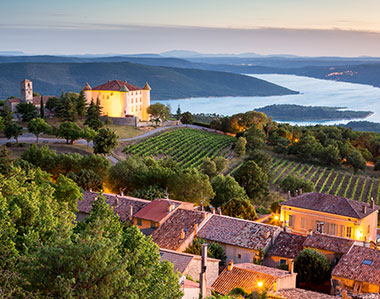 Aiguines village, Provence Photo by Selitbul / Adobe Stock
 Tuileries Gardens, Paris
Photo by Michelle Maria
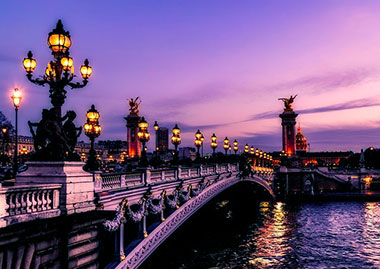 Pont Alexandre III
Photo by David Mark
|
 Aiguines village, Provence
Aiguines village, Provence  Tuileries Gardens, Paris
Tuileries Gardens, Paris  Pont Alexandre III
Pont Alexandre III